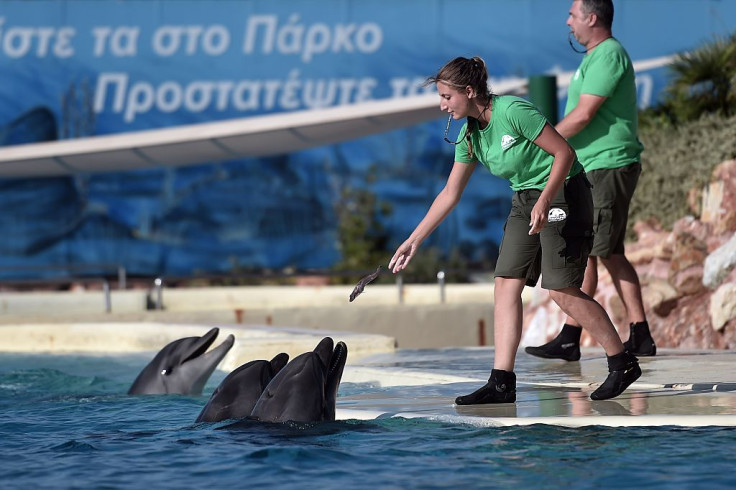Captive Dolphins Look Forward To Interacting With Caretakers, New Study Suggests

A new study exploring the behavior of captive dolphins has revealed the marine animals look forward to interacting and playing with their caretakers more than with toys or among themselves.
The work, conducted by researchers from University of Paris’ animal behavior lab, looked at the anticipatory nature of bottlenose dolphins in French theme park Parc Astérix.
Though dolphins in captivity are known to show anticipatory behavior prior to feeding sessions, not much information was available on how the animals see other aspects of their life. So, the research team conducted a series of experiments to see how they feel or behave during different activities, BBC reported.
As part of these exercises, the researchers used different sound cues to condition the dolphins to three events — the arrival of a caretaker or familiar trainer to play with them, the addition of toys into the water, and leaving them alone to themselves.
In all three cases, the physical reaction of the animals were noted and analyzed to understand how they were feeling.
“We wanted to find out what activities in captivity they like most,” Isabella Clegg, the lead researcher behind the work, told the BBC.
The findings revealed the dolphins appeared more enthusiastic when the sound indicating the arrival of a familiar caretaker was played than those of toys being added or the control situation. They repeatedly engaged in spy hopping or poked their heads out of the water to look around, particularly toward the arriving trainer.
The researchers also correlated the anticipatory behavior of the animals to the actual level of their participation in the activity that followed. The results, as they noted, suggested the dolphins perceived human interaction and toys as reward activities. On this basis, they posited the animals looked forward to interacting with familiar humans and taking part in certain activities.
“We've seen this same thing in other zoo animals and in farm animals,” Clegg added. “Better human-animal bonds equals’ better welfare.”
According to a Newsweek report, the technique used in the study is called “classical conditioning” where an animal is trained in such a way that it learns to associate one thing — a stimulus — with another like a specific sound for a particular task. The method is commonly used to understand the behavior of animals.
That said, though this work gives a rough measure of motivation that could help scientists assess and improve dolphin welfare as well as the management of the other species, it is worth noting this does not indicate the animals are leading happy lives.
The study titled “Looking forward to interacting with their caretakers: dolphins’ anticipatory behaviour indicates motivation to participate in specific events,” was published in the journal Applied Animal Behaviour Science.
© Copyright IBTimes 2024. All rights reserved.





















